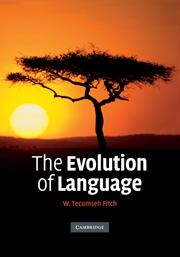Book contents
- Frontmatter
- Contents
- List of figures
- Acknowledgments
- Introduction
- SECTION 1 THE LAY OF THE LAND
- SECTION 2 MEET THE ANCESTORS
- SECTION 3 THE EVOLUTION OF SPEECH
- SECTION 4 EVALUATING PHYLOGENETIC MODELS OF LANGUAGE EVOLUTION
- 11 Historical overview: Western theories of language origin before Darwin
- 12 Lexical protolanguage
- 13 Signs before speech: gestural protolanguage theories
- 14 Musical protolanguage
- 15 Conclusions and prospects
- Glossary
- Appendix: species names
- References
- Author index
- Subject index
- Species index
11 - Historical overview: Western theories of language origin before Darwin
Published online by Cambridge University Press: 05 June 2012
- Frontmatter
- Contents
- List of figures
- Acknowledgments
- Introduction
- SECTION 1 THE LAY OF THE LAND
- SECTION 2 MEET THE ANCESTORS
- SECTION 3 THE EVOLUTION OF SPEECH
- SECTION 4 EVALUATING PHYLOGENETIC MODELS OF LANGUAGE EVOLUTION
- 11 Historical overview: Western theories of language origin before Darwin
- 12 Lexical protolanguage
- 13 Signs before speech: gestural protolanguage theories
- 14 Musical protolanguage
- 15 Conclusions and prospects
- Glossary
- Appendix: species names
- References
- Author index
- Subject index
- Species index
Summary
Humans are eternally fascinated by themselves, and cultures everywhere have a story about how we came to be special (Long, 1963). Language often plays a prominent role in these tales. Western scholarly debate about language origin blends seamlessly with such origin myths, and so I will start this section with a short historical overview, beginning with the book of Genesis and Plato's Cratylus, and moving rapidly through the seventeenth and eighteenth centuries to the views of Darwin, whose ideas on language evolution I will consider more carefully later. This historical overview serves a dual purpose. First, modern discussions of language evolution often present the current revival since 1990 as the first serious scientific attempt to grapple with the problem. This is both factually incorrect and leads to an unnecessary repetition of mistakes, the reinvention of theories, and the rehashing of debates already explored by previous generations. Regarding language evolution, there are very few new hypotheses under the sun, and current debates can and should pick up where our scholarly predecessors left off. The second, and more important, reason is that I believe there are real insights in the older literature which remain unappreciated, particularly those of Darwin and his contemporaries, but these require knowledge of their historical context to be fully understood. Most prominently, it is easy to forget that the pressing questions of one time may become passé, or even entirely ignored, in another.
- Type
- Chapter
- Information
- The Evolution of Language , pp. 389 - 400Publisher: Cambridge University PressPrint publication year: 2010



